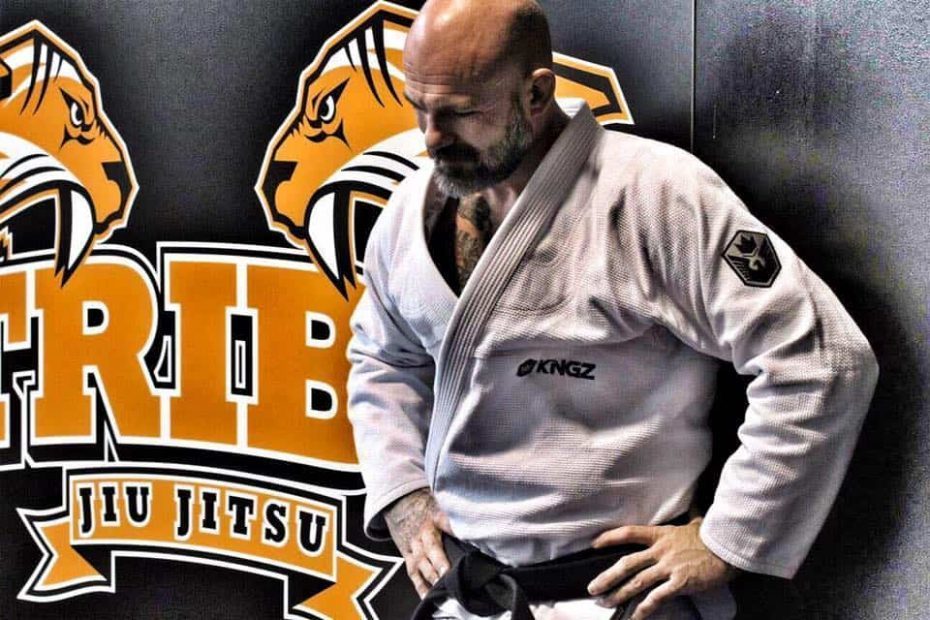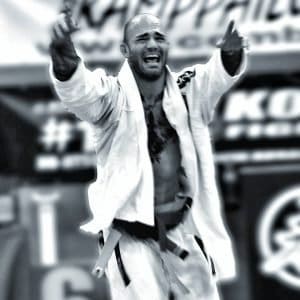Hello professor Tisi, nice to meet you! Can you please introduce yourself and tell us more about the start of your Jiu Jitsu journey?
I started training Jiu Jitsu in 1996, approximately 20 years ago, after seeing UFC 2. I was the first Italian to be a black belt in 2005. I have studied with so many different professors and academies because, at the time, there wasn’t an academy in Italy. So, I had to train and use every opportunity I had. This is how I started. It was very different at the time because there were no Jiu Jitsu competitions. So, I started to train Jiu Jitsu nearly for what is called today MMA. But then, I picked up the whole art and I started to develop it in my country. Eventually, I created Tribe Jiu Jitsu in 1999. This is the first Italian Jiu Jitsu academy which has about 35 affiliates today all over the country. A few years later, together with Dario Bacci, we created the Unione Italiana Jiu Jitsu (UIJJ), which is the Italian Federation of Jiu Jitsu. We represent IBJJF and we organize all of the major tournaments in Italy.

You are the pioneer in Jiu Jitsu in Italy. Can you compare the Jiu Jitsu now and in the past? Where do you see Jiu Jitsu in the next 10 years?
Jiu Jitsu today is different because the sports aspect of Jiu Jitsu is the one that is suitable for more people. So, everybody likes to grow and compete. Even if you’re not young, you can still compete and have fun in tournaments, which is not the case in other martial arts. For example, in MMA. So, it’s something everybody has fun doing and pick it up. Today, people train Jiu Jitsu to fight other Jiu Jitsu people. In the past, we trained BJJ to fight against everyone. It was a different way of seeing the sport. Today is more about the sport while back in the day it was about martial art. We have a big industry of Jiu Jitsu, kimonos and stuff like that. It looks more like an extreme sport, such as snowboarding than a martial art. But this depends a lot on the teacher. In my academy, I try to teach all the aspects of Jiu Jitsu, like self-defense, the sports Jiu Jitsu, and the no Gi, in order to make everybody know 100% of the art. Then, they choose if they want to compete, just train at the gym, or use it in their job. So, it’s important and fun to have the whole package. In the next 10 years, I think that Jiu Jitsu will grow a lot as a sport, but at the same time, there is going to be a very big return of the self-defense aspect. People today start and immediately do some crazy guards, like spider guards and x-guards, even white belt and new belts. But a lot of people come to martial arts because they want to develop their confidence and a sense of security. So, a lot of people don’t relate to this kind of Jiu Jitsu. I think that in the future there will be a comeback to Jiu Jitsu or self-defense in many academies. I also think that the sports Jiu Jitsu is going to grow even more and that there is going to be a creation of a professional league for Jiu Jitsu. Today, you have fighters who come here and they’re dentists, lawyers or students and they train every day, but they also have other things in their life, like families. They have to compete against professional athletes which is very bad. It’s just like as if in boxing you have amateur boxers fight in the same tournament amateur boxers fight with professional ones. It doesn’t make sense. For example, it doesn’t make sense that my student who is a dentist and took his black belt one year ago. So, I think there will be a return to self-defense there will be a bigger expansion of sports Jiu Jitsu and inside sports Jiu Jitsu there will be a professional sport for professional people who train Jiu Jitsu and tournaments for non-professional fighters.
Who influenced you the most in developing your game?
Well, I’ve never had a fixed teacher but many teachers. In every belt, I had a different teacher. Certainly, one of my major influences was Vitor Shaolin Ribeiro. I am the first guy to whom Vitor gave a black belt. At the same time and in the same period, I was training with Carlos “Escorrega” of Gracie Barra. He used to be a really important world champion of Gracie Barra in 2003 in lightweight and featherweight division. But after that I started to train with other teachers and the last one who has influenced me the most in the last five-six years is Eduardo Rocha. He is a 5th degree black belt and he is part of the Ribeiro team. Currently, he is the world champion in several divisions for three years in a row. He is my major influence in the last five to six years. But I learn from everybody and the only major influence I had for 23 years are my students, even white belts. You can learn from everybody.
Tell us more about Tribe Jiu Jitsu.
Tribe Jiu Jitsu was created in 1999 and today we have 35 affiliates, from the north of Italy to Sicily. This is the first Italian Jiu Jitsu academy. We are currently ranked team number one in Italy. We have had a lot of people training and we have a big competition team. Even though we’re not 100% competition Jiu Jitsu, since we like to have everybody on the mat. All of my schools have to go through a structured program which lasts three days in order to start teaching. Let’s say learn how to teach, not only the techniques but also how to handle a class and the things that have nothing to do with training Jiu Jitsu, like training kids, girls who come for the first time to the gym, competitors and how to communicate. By doing so, we organize a common ground for organizing our affiliates and it’s working. We’re doing a wonderful job with teachers from all over the world who come to our academies two times a year. This year is our 20th anniversary as an academy.
How do you sense when someone is ready for a new belt?
When somebody is ready for a new belt depends on the person. You cannot evaluate everybody in the same way. You cannot evaluate a competitor like a non-competitor. Generally, what I look at is the progress from a general point of view. For example, people who get back in shape, stop smoking, come to the gym, have a positive attitude and are more confident. So, it’s a blend of things. But I am kind of old school and it takes time for me to give belts. I’d rather make a mistake of giving the belt one year later than one year earlier. If you give a belt too early, you are going to burn people out and it can be very bad for the person. If you receive a belt one year later than you were supposed to, it will be even better as you’ll feel more confident. Everything today is very quick. For example, you have to become quickly champion, sponsor, get followers on Instagram , etc. So, if you want to be good in Jiu Jitsu it takes time. You have to relax and trust your professor.
H3: Travelling and globetrotting are trending in Jiu Jitsu. What is your opinion about this?
I think that compared to the time when I started when all academies were open yet, it was good to have an opportunity to share and confront yourself with other teachers and other academies. But, in my opinion, you need to have one teacher whom you trust very much and who will give you your main structure. Then, you can go and visit your friend in another academy or do a camp from time to time. In that way, you will have fun training with different people and listening to different teachers. But I don’t think that having a hundred different teachers is good for the person. I think it’s good to have one main teacher and from time to time travel to different places. For example, when you study at school it’s good to do a traveling program in the summer. But if you just travel, you won’t have your own identity. You need to develop a strong identity and keep your eyes and mind open to different things.
Which is your most memorable moment in Jiu Jitsu history?
I have so many memorable moments. I was the first Italian black belt, in 2005 I went to Brazil and I was third place in the World Cup. I went all alone and on my own to fight there. Although I was very afraid, I took third place which was very hard. It was the first time that people saw somebody from Italy go to Brazil, fight the Brazilians and come back with a medal. It was a great inspiration for everybody. Then, a month later I was promoted to black belt. So, I was the first Italian to be promoted and certified with a black belt from the Brazil Confederation as IBJJF didn’t exist at that time. Another great feeling was winning the Europeans in the black belt division in 2010. I have been competing in the Europeans since 2005 but the only time that I won was in what is now Master two division. I went through three tough fights which are a great memory. As a competitor that was my biggest achievement. It was nice to open the way for everybody else and show that it was possible. I am very happy everyone is doing even better today.

Tell us more about your daily routines which help you maintain your condition. Do you have a diet?
I stay on the mat many hours teaching and I don’t know if I have a routine. The conditioning program changes with age as your body changes and you have different problems. Nowadays, I train Jiu Jitsu every day, I give three classes a day, go for 30 to 40-minute round and sparring with my students. I also do Olympic gymnastics twice a week which involves a lot of mobility and stretching. It helps me with my flexibility, recovery and preventing injuries. If you are flexible, you get hurt less. I have always hated stretching and was more into weight lifting. But I have to do something that is good for me like gymnastics. I used to diet a lot when competing because I have motivation. Now I am not dieting but I have a very young girlfriend and I want to look young. So, now I have another motivation to go on a diet. I try to avoid junk food, stay clean, but I don’t have a diet. If I decide to fix my back and my knee to go back to compete, I will have a diet. Generally, Jiu Jitsu fighters are on a diet when competing.
What do you do in your free time? Do have any hobbies outside of Jiu Jitsu?
I stay with my dogs most of my free time, a French bulldog and a small dog. We go for walks. I also like snowboarding, skateboarding, and cycling. I also like reading books. I read a lot, especially biographies and books about great cultures. Mainly, I stay with my dogs and my girlfriend, ride my bike, go snowboarding in the winter, skateboarding in the summer and just have a good time and relax.

What is your advice for people who train BJJ? Everyone speaks about white belts because they are the most confusing ones, can you give some advice for the other colors too?
The main thing I have to tell Jiu Jitsu people is to enjoy. Some people start doing Jiu Jitsu and they enjoy it, but then they get carried away by the competitions and try training all the time. So, they get carried away by stressful things and Jiu Jitsu becomes another source of stress. The first thing I always tell Jiu Jitsu people is to have a smile when they come and leave Jiu Jitsu. If you don’t have a smile, you have a problem, no matter how good you are. We all have problems at work or life in general, so if Jiu Jitsu also becomes stressful, it’s very bad. Just enjoy! Try to go to the gym when you are a white belt and don’t focus on developing your game but try to develop a good overall basic aim. If you are a white belt, you have to have all of the basics down and then you will spontaneously be better. Eventually, this will become your game. It’s more fun to train Jiu Jitsu and try different things and have fun. If it doesn’t work, who cares, it will work tomorrow. Just have fun, stay at the gym, enjoy the good vibe and try being happy in what you’re doing. Jiu Jitsu has to be a way to control the stress in your life. This is especially true today when everybody wants to be good so fast. So, take your time, enjoy, trust your teacher, give yourself time, and you will have a solid Jiu Jitsu after some time. It is going to be something which will stay with you forever. I believe that Jiu Jitsu should be something that you can do all of your life and it should always make you happy and make your life positive. The best thing is that you will start influencing other people positively.

We care about Jiu Jitsu so much that we decided to create this page for all the people like us – that eat, breath and live the Jiu Jitsu Lifestyle! We truly hope our content will make every one of your days better, on the mat and off the mat!
